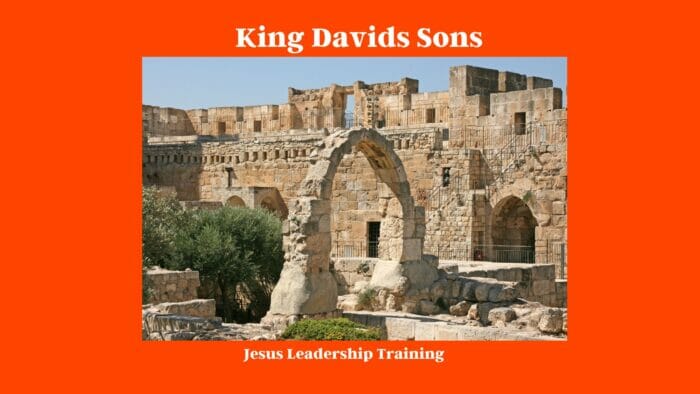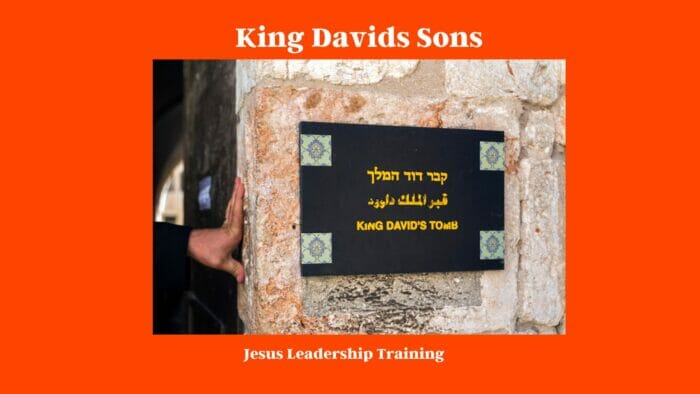King Davids Sons – The Bible, revered by many as a sacred text, is more than just a spiritual guide; it’s a treasure trove of history, culture, and countless human narratives. Among these myriad stories, the saga of King David and his sons stands out for its richness, complexity, and enduring lessons. This article takes you on a captivating journey into the lives of King David’s sons, exploring their unique personalities, actions, and the ripple effects they had on history.
Table of Contents
King Davids Sons – The Lineage of King David
King David, the second king of the United Kingdom of Israel and Judah, had numerous sons. Each one of these sons played a unique role in shaping the trajectory of their kingdom and the history of their people. Let’s delve into the lives of King David’s sons and their fascinating tales of power, intrigue, redemption, and loss.
Here is a table listing the wives of King David and their sons, as mentioned in the Old Testament:
| Wife | Sons |
|---|---|
| Michal | No recorded sons |
| Ahinoam | Amnon, Chileab (also known as Daniel), Absalom |
| Abigail | Chileab (also known as Daniel), Kileab |
| Maacah | Absalom, Adonijah, Shephatiah |
| Haggith | Adonijah, Shephatiah |
| Abital | Shephatiah |
| Eglah | Ithream |
| Bathsheba | Solomon, Nathan, Shammua, Shobab |
This table provides an overview of the wives of King David and the sons they bore him, as described in the Old Testament.
- Michal, the daughter of King Saul, is recorded as David’s wife, but no sons are mentioned in relation to their marriage.
- Ahinoam gave birth to Amnon, Chileab (also known as Daniel), and Absalom.
- Abigail was the mother of Chileab (also known as Daniel) and Kileab.
- Maacah gave birth to Absalom, Adonijah, and Shephatiah.
- Haggith and Abital are mentioned as wives, but their sons are not specified.
- Eglah is mentioned as the mother of Ithream.
- Bathsheba, who was previously married to Uriah the Hittite, became David’s wife after the death of Uriah. Bathsheba bore David four sons: Solomon, Nathan, Shammua, and Shobab.

It is important to note that these are the sons specifically mentioned in the biblical accounts, and there might have been other sons not recorded in the scriptures.
Citation: Wives and sons mentioned in the Old Testament, specifically in the books of 1 Samuel, 2 Samuel, and 1 Chronicles.
Amnon: The Fallen Heir
As the firstborn of King David, Amnon held a special place in the royal line. Unfortunately, his tragic story serves as a stark warning of the perils of uncontrolled desire and entitlement. So, what led to Amnon’s downfall?
Amnon’s Downfall
Amnon’s story, steeped in scandal and tragedy, revolves around his insatiable lust for his half-sister, Tamar. His obsession ultimately led to a terrible act of violation, causing an irreparable rift in King David’s family.
The Consequences of Amnon’s Actions
Amnon’s disgraceful act incited the wrath of Absalom, his half-brother, who eventually avenged Tamar by killing Amnon. This act set a devastating chain of events in motion, culminating in a period of great turmoil for the house of David.
Here is a table of the major events in the life of Amnon, the son of King David, as described in the Old Testament:
| Event | Description |
|---|---|
| Amnon’s Forbidden Desire | Amnon develops a strong desire for his half-sister Tamar, who is the sister of Absalom, another son of David. |
| Deceptive Plot | Amnon’s friend Jonadab devises a deceptive plan for Amnon to get close to Tamar, using a feigned illness as a pretense for her to come and care for him. |
| Amnon’s Rape of Tamar | Amnon seizes the opportunity and rapes Tamar, disregarding her pleas and violating her. |
| Amnon’s Rejection and Expulsion | After the assault, Tamar is devastated and pleads with Amnon to marry her, but he rejects her and orders her to leave. |
| Absalom’s Revenge | Tamar’s brother, Absalom, harbors deep resentment and hatred towards Amnon for his actions. Absalom bides his time, planning revenge against Amnon. |
| Murder of Amnon | Absalom takes his revenge and orders his servants to kill Amnon during a feast, avenging the rape of his sister. |

This table highlights the tragic events in the life of Amnon, the eldest son of King David. It portrays his forbidden desire for his half-sister Tamar, the deceptive plot devised to get close to her, the rape of Tamar, and the subsequent consequences. The table concludes with Absalom’s act of vengeance, resulting in the murder of Amnon.
These events serve as a cautionary tale and reveal the consequences of unchecked lust, betrayal, and the devastating impact of family strife within the context of King David’s household.
Citation: Events based on the biblical account found in 2 Samuel 13.
Absalom: The Vengeful Son
Absalom was another of King David’s sons whose story is filled with intrigue, rebellion, and tragedy. As we dig deeper into Absalom’s life, we’ll uncover a tale of a son driven by revenge, power, and a longing for justice.
Absalom’s Rebellion
Absalom’s thirst for vengeance didn’t end with Amnon’s death. In fact, he launched a full-scale rebellion against his own father, King David, leading to a tumultuous period of civil war in the kingdom.
The Tragic End of Absalom
Absalom’s ambitious gambit ultimately ended in defeat and death. However, his story serves as a reminder of the dire consequences of unchecked ambition and the destructive power of internal family conflict.
Here is a table of the major events in the life of Absalom, the son of King David, as described in the Old Testament:
| Event | Description |
|---|---|
| Amnon’s Rape of Tamar | Absalom’s half-brother, Amnon, rapes their sister Tamar, which deeply angers and traumatizes Absalom. |
| Absalom’s Plot for Revenge | Absalom plans his revenge against Amnon, biding his time for two years before executing his plan. |
| Murder of Amnon | Absalom seizes the opportunity during a feast and orders his servants to kill Amnon, avenging Tamar’s rape. |
| Absalom’s Exile | Absalom flees Jerusalem to escape punishment and seeks refuge with his maternal grandfather, Talmai, the king of Geshur. |
| Reconciliation with David | After several years, Absalom is allowed to return to Jerusalem, but his relationship with David remains strained. |
| Absalom’s Rebellion | Absalom gradually gains the support and loyalty of the people, leading to a rebellion against his father, King David, with the intention of usurping the throne. |
| The Battle of Ephraim’s Wood | Absalom’s forces clash with David’s army in the forest of Ephraim, resulting in a decisive battle where Absalom’s forces are defeated. Absalom himself becomes trapped in a tree, and Joab kills him against David’s instructions. |
| David’s Grief and Mourning | David mourns the death of his son Absalom, expressing deep grief and remorse for the loss of his rebellious child. |
This table highlights the major events in the life of Absalom, the son of King David. It includes the traumatic incident of his sister’s rape, his calculated plot for revenge against Amnon, the murder of Amnon, Absalom’s subsequent exile and return, his rebellion against his father, the battle with David’s army, and ultimately, Absalom’s tragic death.

Absalom’s story serves as a cautionary tale of the consequences of unchecked anger, revenge, and rebellion within a family and a kingdom.
Citation: Events based on the biblical account found in 2 Samuel 13-19.
Solomon: The Wise Successor
King Solomon, another of King David’s sons, is renowned for his wisdom and his monumental accomplishments, such as the construction of the First Temple in Jerusalem. What can we learn from Solomon’s life and reign?
Solomon’s Wisdom
Solomon’s wisdom, a divine gift, played a pivotal role in his successful reign. The biblical account of Solomon’s judgment of two women both claiming to be the mother of a child demonstrates his keen insight and discernment.
Solomon’s Achievements
Under Solomon’s rule, Israel experienced a period of unparalleled prosperity and peace. Solomon’s crowning achievement, the First Temple, stands as a testament to his vision and leadership.
Here is a table of the major events in the life of Solomon, the son of King David, as described in the Old Testament:
| Event | Description |
|---|---|
| Solomon’s Anointing as King | After the death of King David, Solomon is anointed as the king of Israel, succeeding his father. |
| Solomon’s Prayer for Wisdom | In a dream, God appears to Solomon and offers him anything he desires. Solomon humbly asks for wisdom to govern the people of Israel effectively. |
| Solomon’s Wise Judgment | Solomon gains fame for his wisdom and discernment, exemplified by his renowned judgment in the case of the two women claiming to be the mother of the same child. |
| Building the Temple | Solomon undertakes the construction of the First Temple in Jerusalem, which becomes a symbol of worship and centralizes religious practices for the Israelites. |
| Dedication of the Temple | Solomon presides over the dedication ceremony of the Temple, offering prayers and sacrifices to consecrate it as the dwelling place of God’s presence among His people. |
| Solomon’s Wealth and Prosperity | Under Solomon’s rule, Israel experiences an era of great prosperity and wealth. His wisdom attracts international trade, and he amasses great wealth and honor, including the famous visit from the Queen of Sheba. |
| Solomon’s Writings and Wisdom | Solomon is attributed with the authorship of several biblical books, including Proverbs, Ecclesiastes, and Song of Solomon. His wisdom and teachings continue to be revered and studied throughout history. |
| Idolatry and Decline | Despite his initial devotion to God, Solomon succumbs to idolatry in his later years, allowing the worship of foreign gods within the kingdom. His actions lead to a decline in the unity and spiritual vitality of Israel. |
| Succession and Death | After ruling for approximately 40 years, Solomon dies, and his son Rehoboam succeeds him as king. The kingdom faces division and turmoil following his death, marking the end of the united monarchy of Israel. |
This table outlines the major events in the life of Solomon, highlighting his anointing as king, his prayer for wisdom, his wise judgment, the construction and dedication of the Temple, his wealth and prosperity, his writings, and his eventual decline. Solomon’s reign is known for its prosperity, cultural achievements, and his renowned wisdom, which left a lasting impact on Israelite history.
Citation: Events based on the biblical accounts found in 1 Kings and 2 Chronicles, specifically focusing on the life and reign of King Solomon.
Lesser-Known Sons of King David
Beyond Amnon, Absalom, and Solomon, King David had other sons whose stories, though less detailed in the Bible, provide valuable insights into the era and the family dynamics of the time.
Adonijah: The Self-Proclaimed Heir
Adonijah, another of King David’s sons, declared himself king while his father was still alive. His audacious bid for power ended in failure and serves as a cautionary tale about the dangers of presumptuousness and self-entitlement.
I apologize for the confusion, but there is limited information available about the major events in the life of Adonijah, the son of King David, in the Old Testament. Adonijah is mentioned in the biblical narrative, but his story is relatively brief. Here is the available information:
| Event | Description |
|---|---|
| Adonijah’s Self-Proclamation | Adonijah proclaims himself as king without his father’s knowledge or approval. His actions are seen as a challenge to the rightful succession. |
| David’s Response and Solomon’s Ascension | When King David is informed of Adonijah’s self-proclamation, he intervenes and ensures that Solomon, his chosen successor, is anointed as king. |
| Adonijah’s Pardon and Restrained Activity | Solomon, as the new king, shows mercy to Adonijah, sparing his life. However, Adonijah is told to be on his best behavior and refrain from causing trouble. |
While the available information about Adonijah’s life is limited, it suggests his attempt to claim the throne and the subsequent actions taken by King David and King Solomon to establish Solomon as the legitimate successor to the throne.
Citation: The events are based on the biblical accounts found in 1 Kings 1-2, which detail the succession and political challenges during the later years of King David’s reign.
Other Sons: Various Roles, Shared Legacy
The Bible mentions several other sons of King David, such as Shammua, Shobab, and Nathan. Though their stories aren’t as extensively covered as their more infamous brothers, their lives contributed to the shared legacy of King David’s lineage.
Daughters, and their Mothers of King David
Unfortunately, the Old Testament does not provide specific information about the daughters of King David and their respective mothers. While the Bible mentions several sons of David, including Amnon, Chileab (also known as Daniel), Absalom, Adonijah, and Shephatiah, it does not explicitly mention the names or lineage of David’s daughters. The focus of the biblical accounts predominantly centers around David’s sons and their significant roles within the narrative.
It is worth noting that this absence of information about David’s daughters does not necessarily imply their nonexistence. It is possible that David had daughters who are not mentioned in the biblical text, or their details might not have been deemed relevant to the primary biblical narrative concerning the kingship and events surrounding David and his immediate family.
Citation: The Old Testament accounts found in books such as 2 Samuel and 1 Chronicles, which provide information about the sons of King David but do not specify the daughters and their respective mothers.
Frequently Asked Questions
- Who were King David’s sons? King David had many sons, including Amnon, Absalom, Adonijah, and Solomon, who became king after him. The Bible also mentions other sons, such as Shammua, Shobab, and Nathan.
- Who was the most famous of King David’s sons? Solomon is arguably the most famous of King David’s sons. He is renowned for his wisdom and his monumental construction of the First Temple in Jerusalem.
- Who was King David’s firstborn son? Amnon was King David’s firstborn son. His tragic story is a tale of uncontrolled desire leading to disgrace and death.
- Did any of King David’s sons rebel against him? Yes, Absalom, one of King David’s sons, launched a rebellion against his father, leading to a period of civil war in the kingdom.
- Did King David have any sons who tried to seize the throne? Yes, Adonijah, one of King David’s sons, declared himself king while David was still alive, attempting to seize power prematurely.
- What can we learn from the lives of King David’s sons? The lives of King David’s sons teach us about the complexities of human nature, the consequences of our actions, and the importance of wisdom, humility, and justice.
Final Thoughts – Sons of King David
The stories of King David’s sons, filled with intrigue, ambition, tragedy, and wisdom, offer valuable insights into human nature, familial relationships, and the impact of individual actions on societal dynamics. As we revisit these tales, we’re reminded of the enduring lessons they hold — lessons about power, desire, justice, and redemption. Indeed, the narratives of King David’s sons continue to echo through the corridors of history, resonating with timeless wisdom and universal truths.



